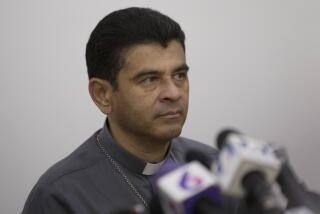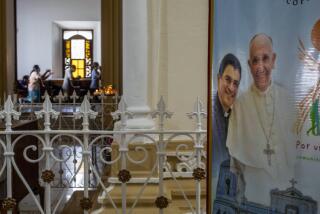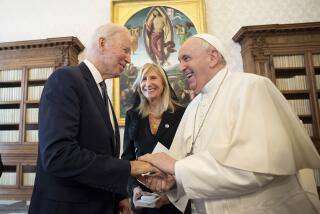Methodist Bishops Urge End to Nicaragua Intervention
- Share via
NEW YORK — Another religious voice--this time from U.S. and Latin American Methodist bishops--has sounded a plea to governments to keep hands off Nicaragua and be “peacemakers and not peace breakers.”
After extensive talks there, the bishops this week declared that “peace with justice” is possible, but must recognize “each nation’s right to determine its own destiny” without interference.
This is a longstanding demand of most major Christian leadership, Protestant and Roman Catholic, in opposing outside military intervention in strife-torn Central America.
President Bush says a review of policy there and elsewhere still is to be completed and it takes “a little time,” particularly since he wants a “bilaterally supported policy” there.
His chosen secretary of state, James A. Baker III, says he doesn’t think that “on humanitarian grounds or moral grounds we can abandon the Contras” but should go slow on any more military aid to the rebel group.
“I think it’s very, very important that we move in a unified way here,” he said.
These remarks last week--Bush in a news conference and Baker to a Senate committee--indicated new efforts to avoid the past keen partisan conflict over the matter, and possibly new approaches to it.
Bishop Kenneth W. Hicks of Topeka, Kan., among those visiting Nicaragua, expressed hope that the Bush Administration will take a “diplomatic rather than confrontational approach” toward the country.
During the eight-year conflict there since the Sandinistas toppled a 40-year dictatorship, both mainline Protestant denominations and the U.S. Roman Catholic bishops have steadily opposed outside military intervention.
The Methodist bishops--16 from the U.S. United Methodist Church, including Bishop Jack M. Tuell of Los Angeles and 15 from Latin American countries--condemned the “violence and violations against the people” of Central American nations as making peace impossible.
In a “declaration of peace and solidarity” issued last Sunday in Nicaragua’s capital, Managua, after five days of discussions with a wide range of Nicaraguans, high and low, the bishops pledged:
“We will demand and expect that our governments act with compassion and justice. . . . We will publicly challenge our governments to be peacemakers and not peace breakers. . . .
“We will work for the development of policies that respect the sovereign rights of other nations to govern themselves without interference.”
The bishops, representing the U.S. Council of United Methodist Bishops and the Episcopal Council of Methodist Churches in Latin America, said they have seen Nicaragua’s war devastation and they urged negotiated settlements.
More to Read
Sign up for Essential California
The most important California stories and recommendations in your inbox every morning.
You may occasionally receive promotional content from the Los Angeles Times.













